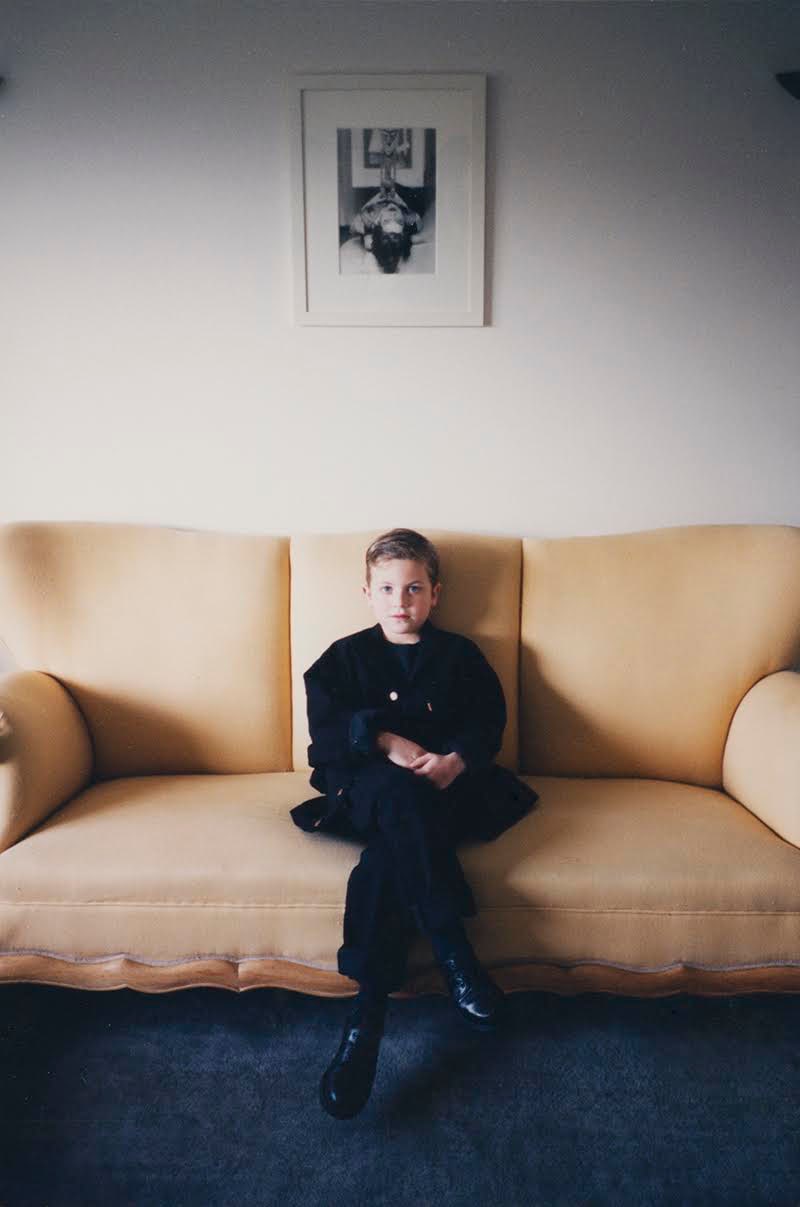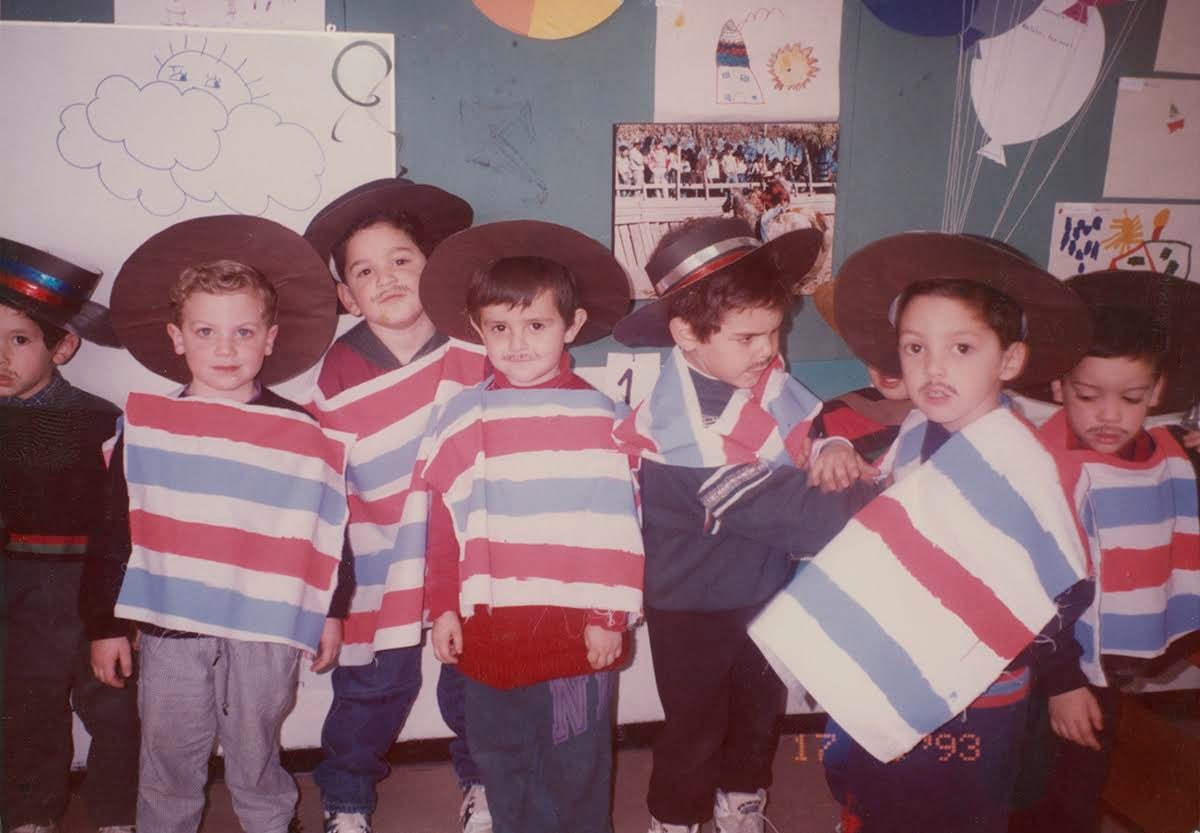Why Nicolas Jaar Made A Grownup Album About The Impact Of History
The electronic composer looked inward, and back to his childhood in Chile, for his exquisite new album, Sirens.
 Nicolas Jaar as a child in Chile
Photo by Evelyne Maynard
Nicolas Jaar as a child in Chile
Photo by Evelyne Maynard
On a September evening in New York City’s Chinatown, 26-year-old electronic producer and composer Nicolas Jaar found himself fixated on finding a portal to another world. When I met the musician, he was pacing backwards around a marble plaque in front of a public library and a neighborhood park. Jaar — who sported jeans and a black t-shirt, accented by a cap that he described as “silly” (it featured a bull wearing earrings) — told me that he had seen a woman walking backwards around the same plaque moments earlier, and “just knew she was onto something.” He explained that the very act of walking backwards seemed like it might hold the keys to another dimension. “It really takes you to a different place,” he said.
It makes sense that Jaar is so earnestly open to possibility. Over the course of his five years in the public eye, the multi-instrumental producer has explored a litany of musical sensibilities: making critically-acclaimed, contemplative club tracks; headlining big budget music festivals; and playing psychedelic rock from another universe alongside producer Dave Harrington under the moniker Darkside. And now there’s Sirens, a 40-minute album of brooding, intimate electronic music that serves as some of the producer’s most elegant, and political, work to date. “I can’t deny that I make music as a form of understanding myself, so a huge part of it doesn’t come from a political place,” he told me as he perched on a bench in the park. “But of course, I feel like I can’t exist in 2016 without being political.”
The day before Jaar’s attempt at an inter-dimensional journey, another otherworldly event took place. Viewed by over 80 million people, the first presidential debate between reality television star Donald Trump and former secretary of state Hillary Clinton confirmed a suspicion that the musician — and probably a lot of people — have. “For at least the past few years it has felt like the world is reaching something of a boiling point,” Jaar said. “Things just continue to get more and more insane.” It was the rise of Donald Trump’s xenophobic rhetoric that pushed Jaar to explore the political aspects of his own life on Sirens. Jaar is Chilean, and seeing a bona-fide tyrant gain ground in American polls brought to mind Augusto Pinochet, Chile’s brutal, CIA-backed president whose 16-year tenure saw 3,200 citizens killed and tens of thousands more tortured. The album’s cover art features the lyrics from the record’s most overtly political track, “No”: Ya dijimos no pero el si esta en todo, which translates to, We already said no but the yes is in everything. The text is laid over a still from a controversial visual installation by Jaar’s father — the renowned Chilean artist Alfredo Jaar — titled This is Not America. The line is a reference to the Chilean national plebiscite, a 1988 referendum that gave the citizenry the chance to vote “yes” or “no” to re-elect Pinochet. With the help of activists and artists, the “no” vote won, but as Jaar’s lyric suggests, the lingering effect of Pinochet’s reign — the “yes” — lives on.
Nicolas Jaar was born in New York in 1990, just months after Pinochet was voted out of office. When he was three, his parents split up and his mother took him home to Chile. Despite his Chilean heritage, the kids in his class, after hearing he was born in New York, saw him as American. “It was like they looked at me and saw CIA,” Jaar told me. Then, when Nicolas was nine, his parents got back together and the family returned to New York. But he discovered he felt equally out of place as one of the only South American students in his class of upper crust white students. “People not knowing whether or not my mom was my mother or my babysitter,” he said. “That’s the kind of thing that freaks you out as a kid. I’ve had these sort of weird relationships with where I’m from. Just this kind of fucked up soup of CIA, Chile, and how now some parts of Santiago look like Miami. All of that is weirdly embedded in my own history.”
Just before he began work on Sirens, Jaar was invited to play at The Museum of Memory and Human Rights in Chile, a museum honoring those killed during Pinochet’s regime. The event ended up sending the producer on a set of inquiries he hadn’t expected. “When I went to play, I talked with a bunch of people on the left in Chile and it was kind like this feeling I got that Pinochet’s impact still lives.” He began to draw comparisons with the way “Reagan’s impact still lives in the U.S., or Thatcher in the U.K. That’s where I felt there was something interesting to say.”
In conversation, Jaar tinkers with ideas in real time as they gestate in his mind. One of the most common phrases I heard from him during our interview was “maybe not,” as though, despite his own confidence in an answer, he’s aware that there’s always a bigger picture — that things are often not as straightforward as they seem. Jaar’s music reflects this contemplative spirit. The producer’s tracks are known to linger with spacious moments of silence that question the very nature of dance music. In 2011, when he was 21, Jaar released Space Is Only Noise, a slow-burning debut full of lush, atmospheric tracks equally fit for raves and spiritual journeys, but ideal for both. The record introduced Jaar as something of a prodigy in the electronic community and made him a much sought-after DJ. Soon enough, the young producer would become a mainstay at some of the most prominent festivals and clubs in Europe. During the years that followed, Jaar released a smattering of breathtaking singles imbued with the sort of thoughtful, euphoric energy that draws so many people to club culture in the first place.
 Nicolas Jaar as a child in Chile
Photo by Evelyne Maynard
Nicolas Jaar as a child in Chile
Photo by Evelyne Maynard
“I’ve had these sort of weird relationships with where I’m from. Just this kind of fucked up soup of CIA, Chile, and how now some parts of Santiago look like Miami. All of that is weirdly embedded in my own history.”
Lately, however, Jaar’s music has taken a turn towards the personal. Last summer he released Pomegranates, an alternate soundtrack to Sergei Parajanov's 1969 avant-garde film The Colour of Pomegranates that, like the film, explores the emotional textures of various stages of life. Shortly after, he released Nymphs II, a similarly kaleidoscopic pair of tracks that, while difficult to pin down, contains some of Jaar’s most intricate experimentations. “I had made these two records [Nymphs II and Pomegranates] and I felt like I was talking too much about myself,” he reflected. “Because to me, those records look just like mirrors of myself. They’re very, very personal records. I feel extremely naked listening to that stuff. I mean I don’t even listen to it, but even thinking about it.”
It was also around this time that Jaar started thinking more about the broader connotations of electronic music. Specifically, how the ethnic and socioeconomic makeup of clubs had shifted, drastically, in a different direction.
“At the beginning, the idea of a rave was tied to a very intense political context,” he told me. “If you think about New York, it wasn’t the wealthy white kids who were going to the clubs, it was the gay black and Latino communities that played and attended those parties. So you have something happening now where the birth of the music we’re talking about is, in many ways, not part of the larger mainstream view of this culture.”
The idea of connecting music to its culturally specific influences has long been crucial to Jaar. He recalls how, in 2010, he made two songs in Spanish ("Mi Mujer" and "El Bandido") as a response to a trend in dance music where American and European DJs would sample South American artists with no compensation. “I felt like there was a sort of colonialism going on that no one was talking about,” he reflected. Jaar looks back on those songs — treacly pop tunes in substance — as sort of silly but necessary reflections on context. “I wrote these two songs in a way because I could,” he said. “I could sing in Spanish and for me it wasn’t just a trend — it was the music I grew up with.”
Now, alongside broader, more inclusive conversations about cultural appropriation and authorship happening online, artists are increasingly expected to understand their music’s cultural context. In dance music, collectives like Papi Juice, Discwoman, and N.A.A.F.I offer up distinct challenges to the straight, eurocentric, cisgendender hegemony present in club culture. In hip-hop and R&B, a significant movement in the past couple years has been music that speaks specifically and passionately to the intricacies of the black experience. Blood Orange assembled an army of immensely talented black creatives on Freetown Sound. Solange, similarly, created a paean to black womanhood on her latest, A Seat at the Table. Jaar himself points to Kendrick Lamar’s 2015 album, To Pimp a Butterfly, as an example: “He’s making people think about context, which is really inspiring — the way he opened up that entire conversation in such a big way.”
 Jaar and his classmates in Chile
Photo by Evelyne Maynard
Jaar and his classmates in Chile
Photo by Evelyne Maynard
“I think the record was a little bit of unpacking who I thought I was and who I think I am now. When we think about ourselves and where we are at a certain moment in time, what defines that might also have to do with a lot of delusions.”
Sirens is in many ways Jaar’s expression of this new conversation on context. The album finds the producer interrogating the narratives that have defined his sense of self for his entire life. The six-track record is full of delicate, introspective moments that feel both historical and prophetic in their perspective. Album opener “Killing Time” begins with the sound of a flag waving — crinkling distinctly in the wind, the full weight of its distance from the ground captured in Jaar’s dense, airy production — and includes the sound of mirrors crashing into dozens of collapsing shards. The song’s lyrics allude to Ahmed Mohamed, the 14-year-old arrested in Texas last year for taking a homemade clock to school. He was just building his own sense of time, Jaar sings, as a bewitching piano melody ushers in echoes of his vocals. Given his isolating experience with his childhood classmates in Chile, it makes sense that Nico connected with Ahmed; their experiences might’ve been different, but their lives were both touched by deep-seated, anti-foreigner paranoia. Subdued by deep reverb, “Killing Time” clocks in at roughly eleven minutes and touches on issues of capitalism, race, and democracy via strands of verses that only make sense when consumed as a whole — that only make sense in context.
For nine months in 2015, Jaar wrote the album in his Brooklyn home while adhering to a strict regiment. He woke up early in the morning and did what he describes as “a lot of chance-based stuff.” He opened books to random pages and read whatever he saw, and spent hours each day writing using a free-association method. Jaar says he lived by this regimen in part as his natural inclination towards isolation and also in search of clarity. When I asked him what he was looking for clarity on, he paused for what felt like hours before responding, “Do you feel like at some point of your growing up, you were sort of just blindly moving through things?” I told him I feel that way about my four years in college and he offers up a similar period in his life. “I think I’ve had that feeling for most of my public career. Like, I can’t believe I never sat down once and thought like, OK, what do I really want to do? What do I really want to say here?”
It makes sense, then, that Sirens features so many allusions to Jaar’s youth. In looking back to where one comes from, there are often answers to who someone is currently. On “Leaves,” audio of Jaar as a child telling his father about a statue can be heard over marauding bass that menacingly augments the light-hearted exchange. The recording is from a home video of Jaar taken a week before he and his mother left for Chile in 1993. The track serves as a fitting segue into “No,” the centerpiece of the entire record. The song, whose lyrics are entirely in Spanish, has an infectious, reservedly optimistic energy. With its reggaeton percussion blended with Jaar’s signature hazy production, “No” sounds triumphant but cautious; a celebration of the end of terror while cognizant of its long-term impact. The song’s politics are a historical mish-mash of references that look at the ramifications of Pinochet’s legacy and asks whether or not the lessons of one country’s past can be applied to the rest of the world. “Is that okay, even? Is it even okay to take from one historical idea and try to apply it to the U.S.?” Jaar asks, “Maybe not, but I still wanted to just pose the question. I see it as weird surrealism or like a cut-up Dada poem but with history.”
Considering the ways in which regimes in different countries are connected through their lasting influence made Jaar think about the deep ramifications of his childhood. As he made connections between the political history of Chile, the U.S., and the U.K., Jaar noticed how much differently he viewed his own memories of himself in Chile. “I think the record was a little bit of unpacking who I thought I was and who I think I am now,” he said. “When we think about ourselves and where we are at a certain moment in time, what defines that might also have to do with a lot of delusions.”
At the park, Jaar seemed genuinely happy, serene even. Asking about the very nature of yourself can be daunting, but now, removed from his stringent album-writing routine, he speaks with an enviable sense of clarity. It’s like he’s made peace with trying to know himself completely, resigned instead to observe his own flawed memory. Sirens reflects this sense of self-contentment. A brisk, transformative work, it welcomes a world of possibilities by posing a series of questions — and always considering the answer, “maybe not.”
As the park cleared and streetlights flickered on in response to the coming night — one of the first cold evenings in the waning days of summer — the woman who inspired Nico to walk around in circles returned, but this time she walked forward around the plaque. Excited, Jaar turned to me and said, “I’m telling you, there’s something there.”
